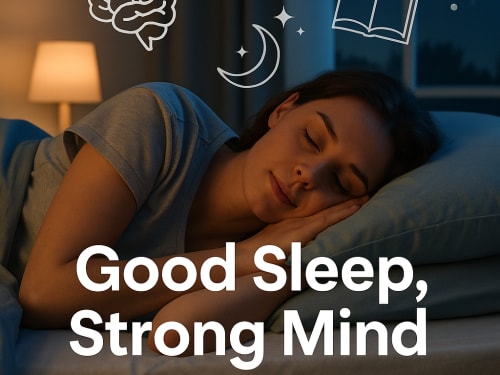The Psychology of Sleep: How Rest Protects Your Mind

posted 23rd September 2025
The Psychology of Sleep: How Rest Protects Your Mind
Sleep is often the first thing we sacrifice when life gets busy. Late nights, early mornings, and the idea that we can “catch up” on rest later are common. But psychology and neuroscience show us that sleep is not a luxury; it’s one of the most powerful tools for protecting our mental health. From regulating mood to strengthening memory, sleep acts as the brain’s nightly reset button. In fact, good sleep is so critical that many psychologists now consider it a cornerstone of mental well-being.
Why Sleep Matters for Mental Health 🧠
Sleep is not just downtime; it’s an active process that supports core psychological functions:
- Memory and learning:During deep sleep, the brain consolidates new information and strengthens neural connections. This makes sleep essential for students, professionals, and anyone trying to learn new skills.
- Emotional regulation:Sleep helps regulate neurotransmitters like serotonin and dopamine, which are key to mood stability. Well-rested individuals are more resilient to stress and less prone to emotional reactivity.
- Cognitive performance:Focus, decision-making, and creativity all rely on adequate rest. Without it, mental clarity quickly deteriorates.
The Cost of Poor Sleep 😴
Chronic sleep deprivation doesn’t just make you feel tired; it has profound effects on mental health:
Anxiety and depression: Research consistently links poor sleep with a higher risk of mood disorders. Insomnia is both a symptom and a predictor of depression.
Burnout and stress: Lack of sleep raises cortisol, the stress hormone, leaving the body in a constant state of alertness.
Cognitive decline: Poor sleep impairs memory, slows reaction times, and makes complex problem-solving more difficult.
What the Research Says 📚
Psychology research has repeatedly shown the strong relationship between sleep and mental health:
A 2023 meta-analysis found that sleep deprivation significantly increases symptoms of anxiety within just one night of restricted rest (Palmer & Alfano, 2023).
Hertenstein et al. (2019) reviewed data from over 30 studies and found that insomnia doubles the risk of developing depression.
Walker and van der Helm (2009) highlighted the central role of REM sleep in processing emotional memories, which helps the brain recover from daily stressors.
How to Improve Sleep (Psychologist-Backed Tips) 🌙
Fortunately, even small changes can dramatically improve sleep quality. Psychologists recommend:
- Keep a consistent routine→ Go to bed and wake up at the same time every day, even on weekends.
- Limit blue light before bed → Reduce screen time 1 hour before sleep to allow melatonin (your sleep hormone) to rise naturally.
- Create a sleep-friendly environment→ Keep your room cool, dark, and quiet; reserve your bed for sleep only.
- Practice relaxation techniques→ Breathing exercises, progressive muscle relaxation, or mindfulness can reduce nighttime anxiety.
- Cut caffeine and alcohol late in the day → Both disrupt sleep quality, even if they don’t stop you from falling asleep.
Good sleep is not wasted time; it’s one of the most effective, natural ways to boost your mood, sharpen your focus, and build resilience against stress and mental illness. Treating sleep as a daily investment in your brain can pay off in better well-being, clearer thinking, and a healthier emotional life.
References
Hertenstein, E., Feige, B., Gmeiner, T., Kienzler, C., Spiegelhalder, K., Johann, A., Jansson-Fröjmark, M., Palagini, L., Rucker, J., Schlarb, A., & others. (2019). Insomnia as a predictor of depression: A meta-analytic evaluation of longitudinal epidemiological studies. Journal of Affective Disorders, 243, 10–21.
Palmer, C. A., & Alfano, C. A. (2023). Sleep deprivation and its impact on anxiety: A meta-analysis. Sleep Medicine Reviews, 67, 101717.
Walker, M. P., & van der Helm, E. (2009). Overnight therapy? The role of sleep in emotional brain processing. Psychological Bulletin, 135(5), 731–748





